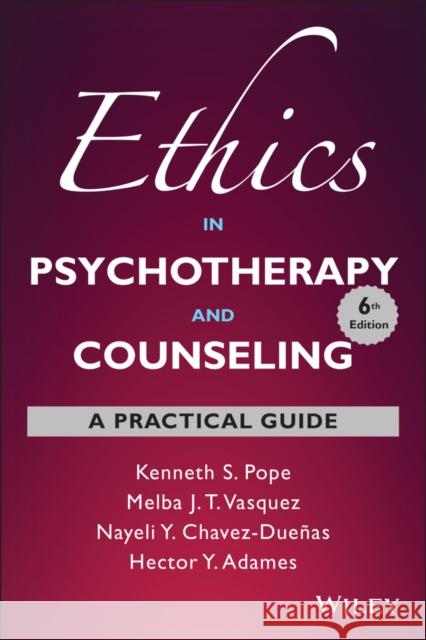Ethics in Psychotherapy and Counseling: A Practical Guide » książka



Ethics in Psychotherapy and Counseling: A Practical Guide
ISBN-13: 9781119804291 / Angielski / Miękka / 2021 / 496 str.
Ethics in Psychotherapy and Counseling: A Practical Guide
ISBN-13: 9781119804291 / Angielski / Miękka / 2021 / 496 str.
(netto: 304,17 VAT: 5%)
Najniższa cena z 30 dni: 315,48
ok. 30 dni roboczych.
Darmowa dostawa!
"The 6th edition of Ethics in Psychotherapy and Counseling is a practical and indispensable guide for clinicians. The volume is filled with up-to-date information and actionable steps on ethics including telehealth and social media. What sets the book apart is its consistent attention to an ethics grounded in dignity, respect, and human rights. I am excited about its release!"--Jennifer F. Kelly, PhD, ABPP, 2021 President, American Psychological Association"This is the best psychology ethics book on the market; a must-have resource for any applied psychologist or mental health professional. The internationally recognized scholars and practitioners use research, case examples, legal decisions, and diversity-related topics to bring ethical dilemmas to life. This volume makes me excited to teach on ethics."--Helen A. Neville, PhD,Professor in the Department of Educational Psychology at the University of Illinois at Urbana-Champaign"The 6th edition is a stunningly good book. If there is only one book you buy on ethics, this is the one."--David H. Barlow PhD, ABPP,Professor of Psychology and Psychiatry Emeritus;Founder, Center for Anxiety and Related Disorders (CARD), Boston University"No other ethics text comes close to matching its comprehensiveness. The 6th edition is a paradigm of excellence and should be required reading for all mental health practitioners."--Derald Wing Sue, PhD, Professor of Psychology and Education Teachers College, Columbia University"This 6th edition of Ethics in Psychotherapy and Counseling takes ethical reasoning and practice to a new level by addressing the complexity of video conferencing and the use of digital tools while emphasizing issues of diversity, equity, and inclusion. An absolute must-read for all clinicians."--Martin Drapeau, PhD, Professor, McGill University; former editor of Canadian Psychology"Like all areas of human functioning, ethics is influenced by culture. Yet, during my psychological training over 20 years ago, the recognition and inclusion of topics related to culture and other diverse aspects of the human experience (e.g., race, gender, religion, sexual orientation) in ethics were marginalized, if they were mentioned at all. In this 6th edition of Ethics in Psychotherapy and Counseling, the authors have updated an already classic book that is responsive to the emergent needs of this historical moment."--Kevin O. Cokley, PhD, Professor of Educational Psychology and African and African Diaspora Studies, The University of Texas at Austin"The authors of this 6th edition continue to represent the 'conscience of psychology.' The inclusion of new and important material makes this the essential handbook of ethics in contemporary psychology."--Bonnie R. Strickland, PhD, Former President, American Psychological Association"This is a MUST READ for both beginning and seasoned clinicians. KUDOS!"--Don Meichenbaum, PhD, Research Director of the Melissa Institute for Violence Prevention, Miami
Table of ContentsDedicationsThe AuthorsPrefaceAcknowledgmentsPart 1: FoundationsChapter 1 Helping Without HurtingChapter 2 Ethics in Real LifeChapter 3 Ehtics Theories and CodesChapter 4 Dignity and RespectChapter 5 Trust, Power, Caring, and HealingChapter 6 Competence, Humility, and the Human TherapistChapter 7 Culture, Context, and Ethics in Psychotherapy and CounselingChapter 8 Steps in Ethical Decision-MakingChapter 9 Moral Distress and Moral CouragePart II: Common Sources of ProblemsChapter 10 Ethics, Science and PseudoscienceChapter 11 Ethical FallaciesChapter 12 Pitfalls in Ethical JudgementChapter 13 Language and EthicsChapter 14 Ethics Placebos, Rationalizations, and ExcusesPart III: Special TopicsChapter 15 Beginnings and Endings, Absence and AccessChapter 16 Informed Consent and Informed RefusalChapter 17 Creating and Using Strategies for Self-CareChapter 18 Creating a Professional WillChapter 19 Responding to Ethics, Licensing, or Malpractice ComplaintsChapter 20 Assessment, Testing and DiagnosisChapter 21 ConfidentialityChapter 22 Recognizing, Assessing and Responding to Suicidal RiskChapter 23 Supporting Human Rights and Adressing Oppression in PsychotherapyChapter 24 Therapists in a Virual World: Teletherapy, Electronic Records, and Social MediaChapter 25 Sexual Attraction to Patients, Therapist Vulnerabilities, and Sexual Relationships with PatientsChapter 26 Nonsexual Multiple Relationships and Other Boundary Crossings: The Therapeutic and the Harmul, the Risky and the InevitableChapter 27: Steps to Strengthen Ethics in Organizations: Resarch Findings, Ethics Placebos, and What WorksReferencesAbout the AuthorsAuthor IndexSubject Index
Kenneth S. Pope, PhD, a psychologist in independent practice, chaired the ethics committees of the American Psychological Association and the American Board of Professional Psychology. He received the 2015 Canadian Psychological Assoication John C. Service Member of the Year Award.Melba J.T. Vasquez, PhD, is a licensed psychologist and former President of the American Psychological Association. She is a Fellow of ten divisions of the American Psychological Association and is a recipient of the 2020 APA Award for Lifetime Achievement.Nayeli Y. Chavez-Duenas, PhD, is a licensed psychologist and professor. She is a recipient of the 2018 American Psychological Association Distinguished Citizen Psychologist Award.Hector Y. Adames, PsyD, is a licensed psychologist and professor. He chaired the Committee on Ethnic Minority Affair (CEMA) of the American Psychologist Association (APA) and is a recipient of the 2018 Distinguished Emerging Professional Contributions to Research Award from the Society for the Psychological Study of Culture, Ethnicity, and Race of the APA.
1997-2026 DolnySlask.com Agencja Internetowa
KrainaKsiazek.PL - Księgarnia Internetowa









